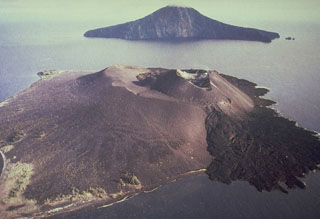Report on Krakatau (Indonesia) — December 2002
Bulletin of the Global Volcanism Network, vol. 27, no. 12 (December 2002)
Managing Editor: Richard Wunderman.
Krakatau (Indonesia) Seismicity dominated by volcanic earthquakes through at least December 2002
Please cite this report as:
Global Volcanism Program, 2002. Report on Krakatau (Indonesia) (Wunderman, R., ed.). Bulletin of the Global Volcanism Network, 27:12. Smithsonian Institution. https://doi.org/10.5479/si.GVP.BGVN200212-262000
Krakatau
Indonesia
6.1009°S, 105.4233°E; summit elev. 285 m
All times are local (unless otherwise noted)
During 9 September through at least late December 2002, seismicity at Krakatau was dominated by A-and B-type volcanic earthquakes (table 2). Throughout the report period, clouds obscured the view of the summit. Krakatau remained at Alert Level 2.
Table 2. Earthquakes registered at Krakatau during 9 September-29 December 2002. No data were available during 16-29 September. Courtesy VSI.
| Date | A-type volcanic | B-type volcanic | Tectonic |
| 09 Sep-15 Sep 2002 | 2 | 6 | 3 |
| 30 Sep-06 Oct 2002 | 8 | 31 | 6 |
| 07 Oct-13 Oct 2002 | 30 | 109 | 6 |
| 14 Oct-20 Oct 2002 | 18 | 64 | 3 |
| 21 Oct-27 Oct 2002 | 7 | 55 | 5 |
| 28 Oct-03 Nov 2002 | 8 | 54 | 11 |
| 04 Nov-10 Nov 2002 | 28 | 56 | 5 |
| 11 Nov-18 Nov 2002 | 2 | 31 | 5 |
| 02 Dec-08 Dec 2002 | 16 | 50 | 5 |
| 09 Dec-15 Dec 2002 | 13 | 53 | 13 |
| 16 Dec-22 Dec 2002 | 6 | 32 | 1 |
| 23 Dec-29 Dec 2002 | 11 | 59 | 2 |
Geological Summary. The renowned Krakatau (frequently mis-named as Krakatoa) volcano lies in the Sunda Strait between Java and Sumatra. Collapse of an older edifice, perhaps in 416 or 535 CE, formed a 7-km-wide caldera. Remnants of that volcano are preserved in Verlaten and Lang Islands; subsequently the Rakata, Danan, and Perbuwatan cones were formed, coalescing to create the pre-1883 Krakatau Island. Caldera collapse during the catastrophic 1883 eruption destroyed Danan and Perbuwatan, and left only a remnant of Rakata. This eruption caused more than 36,000 fatalities, most as a result of tsunamis that swept the adjacent coastlines of Sumatra and Java. Pyroclastic surges traveled 40 km across the Sunda Strait and reached the Sumatra coast. After a quiescence of less than a half century, the post-collapse cone of Anak Krakatau (Child of Krakatau) was constructed within the 1883 caldera at a point between the former Danan and Perbuwatan cones. Anak Krakatau has been the site of frequent eruptions since 1927.
Information Contacts: Volcanological Survey of Indonesia (VSI), Jalan Diponegoro No. 57, Bandung 40122, Indonesia (URL: http://www.vsi.esdm.go.id/).

